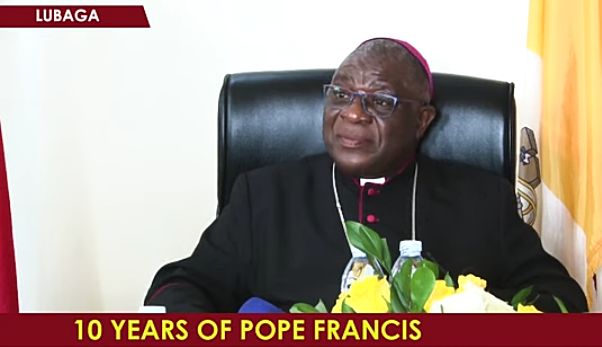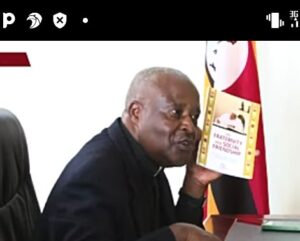UGANDA: Kampala Archdiocese Celebrates 10th Anniversary of the Pontificate of Pope Francis

Most Reverend Paul Ssemogerere, Archbishop of Kampala Archdiocese while reflecting on the 10th anniversary of Pope Francis' Pontificate at Rubaga, Uganda
Fr Isaac Ojok
The Archdiocese of Kampala in Uganda on Wednesday marked the 10th anniversary of the Pontificate of Pope Francis an event hosted by Most Reverend Paul Ssemogerere the Archbishop of Kampala at Rubaga.
On the 13th March 2023, Pope Francis marked ten years as the Supreme Pontiff of the universal church since his election as the 266th Roman Catholic pontiff on 13th March 2013.
In Kampala Archdiocese, the anniversary was marked with reflections on the pontificate of Pope Francis bringing to light his wisdom teachings on faith and morals, his teaching on Synodality, position of elderly and grandparents, environment, poor and the marginalized, Economy of inclusion among others.
While celebrating 10 years of Pope Francis, Rev Fr. Professor Emmanuel Katongole a Professor at Notre Dame University in the United States also the main speaker at the event explained the seven key interrelated dimensions that identifies Pope Francis since his election in 2013 of which such dimensions are always observed in many of his homilies, pronouncements and gestures among others.
According to the presenter, the first aspect that explains Pope Francis’ ministry is God’s mercy since God’s mercy and love is a foundation of Christian life the reason why soon after his election as Pope, he announced 2015 and 2016 to be the year of mercy, to give opportunity to people to experience God’s mercy, love and tenderness. This comes out of his own experience of encounter with the mercy of God.
He went on to say Pope Francis has ever and constantly reminded people that God never tires of granting His people pardon, since everything is grounded on the love, mercy of God that extends to every one irrespective of one’s status.
Professor Katongole further explained that the second dimension that explains Pope Francis’ ministry is based on his Pontificate, Leadership that is well cemented with Joy as it is highlighted in His Apostolic Exhortation dubbed, “The Joy of the Gospel” written in 2013, where he laid out his vision and tone for Christian life. In it, he said the Pope demonstrated that the Gospel always radiates the glory of Christian course and constantly invites us to rejoice especially the priests, religious, and agents of evangelization and everybody created in the likeness of God to rejoice and never to allow themselves to be robbed of the joy that comes from God.
In his reflection that was live on various media platforms, he observed that close attention to the poor and the marginalized is the third element that defines Pope Francis’ pontificate with the remarks that Pope Francis looks at the mercy of God as the gift to be experienced by the people who are at the margin particularly the poor, the sick, the refugees, migrants, the elderly and those who are usually excluded from the society noting that is the reason that made Pope Francis stated that the Mercy of God should be felt, experienced in a more special way by those being sidelined or left out completely because God’s heart has special place for such like the widows, orphans and the marginalized people.

during the session of Reflection
on the 10th Pontificate of Pope Francis
He further advanced his reflection by saying because of the closeness of Pope Francis to the poor, he visited Women’s prison in Rome soon after his election as Pope, a point where he performed the washing of the feet in the Holy Week. Apart from his visit to Women’s prison in Rome, the presenter further shared that the first trip Pope Francis made outside Rome was in the small island called Lampeduza where he extended his closeness to the poor especially the migrants who were then seeking refuge in Europe, the reason why after his visit, he invited families, parishes and institutions to open up their doors to the refugees and migrants to give comforts to them.
Moving on with his reflection, he revealed that the fourth element in the ministry of Pope Francis is his vision of what the Church is called to be where, according to the Pope, the church is called to be a sacrament of God’s mercy which is built on mission that should be outgoing to those in the periphery, to heal wounds on people injured in different circumstances of life, journeying together, listening to one another above all bringing everybody in conversation which is highly stressed in his teachings on synodality of Communion, Participation and Mission.
On solidarity, he said is the fifth element that explains Pope Francis’ ministry where his emphasis is that people are all connected and they belong together in the experience of God’s mercy that is why the Holy father is against the culture of indifference, the culture that is hostile to people, the culture that creates gap between the poor and the rich and as a result, he emphasized that all must dream of a new future.
Following his solidarity, Professor Katongole further highlighted that the Holy Father has recently met the Managers of large companies in Assisi and he invited them to dream of new economics and solidarity that does not marginalize the poor, giving example of the solidarity with new face not only on humanitarian aid but on initiating justice, building institutions that enable the poor to take full control of their lives as guided in his Encyclical Letter, “Fraternity and Social Friendship”, of 3rd October 2020.
Fr Katongole pointed out nonviolence as the element that describes the ministry of Pope Francis. He noted that Pope Francis all along has been opposed to the use of force and violence where he argued against just war theory in the modern war fare and observed that there cannot be any war that is justified, just like his predecessor St John Paul II when he noted that violence is evil and is not acceptable as a way to solve problems and is against the truth of Christian faith, and it destroys human dignity.
He went on with his reflection and said Pope Francis looks at non-violence as a very proactive and a form of engagement, style of life and a way of responding to evil with good which is grounded in dialogue, reconciliation, the reason why people observe his constant prayers and wishes for peace in countries torn apart by violence with the recent visits to many places in quest for peace citing recent one as being Democratic Republic of Congo, and South Sudan respectively with his appeal to people to build consistent ethic of nonviolence by saying no to abortion, death sentence, capital punishment, killing among others.
Professor Katongole disclosed that the last dimension that describes Pope Francis’ pontificate to be his love and care for creation, the response to the cry of the mother earth which is observed to be a result of the burden of environmental destruction, gradual exploitation of natural resources, pollution, mining, and deforestation. In line with this, he noted that the Holy Father has invited everyone to respond to the cry of the mother earth with the immediate need for mindset change, need for new programs, spirituality that connects humanity to God and to creation, new lifestyle that does not endanger our common home.
According to him, as a result of the love and care for the mother earth, the Holy Father after a period of five years of his Encyclical Letter Laudato si he called the whole church to take action platform that gave seven years to families, schools, institutions, parishes dioceses to come with some environmental conservation mechanisms as remedy to the challenges of environmental protection, and the urgent and pastoral priority for the whole church.
The host of the event being the Most Reverend Paul Ssemogerere, the Archbishop of Kampala was flanked by others in attendance like Fr Dr Ambrose Bwangaato the Lecturer at St Mbaaga Major Seminary Ggaba also director of the Pontifical Missionary Society Kampala including other dignitaries.
End


